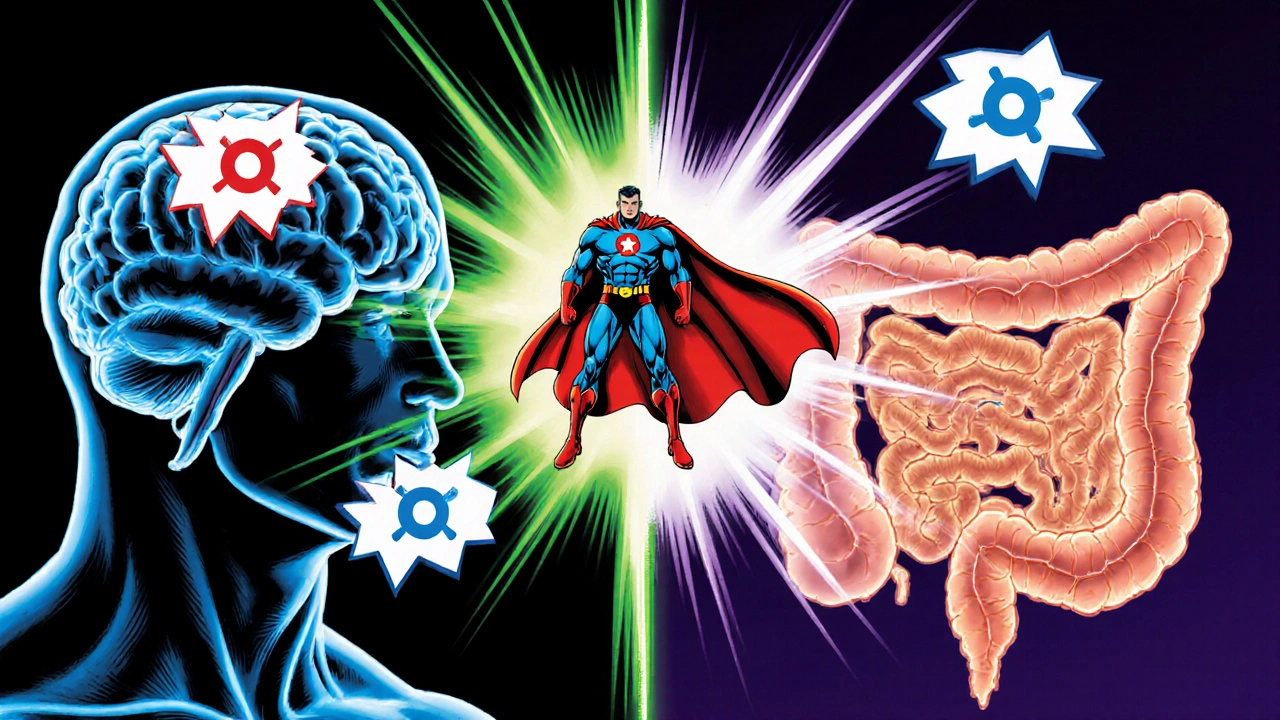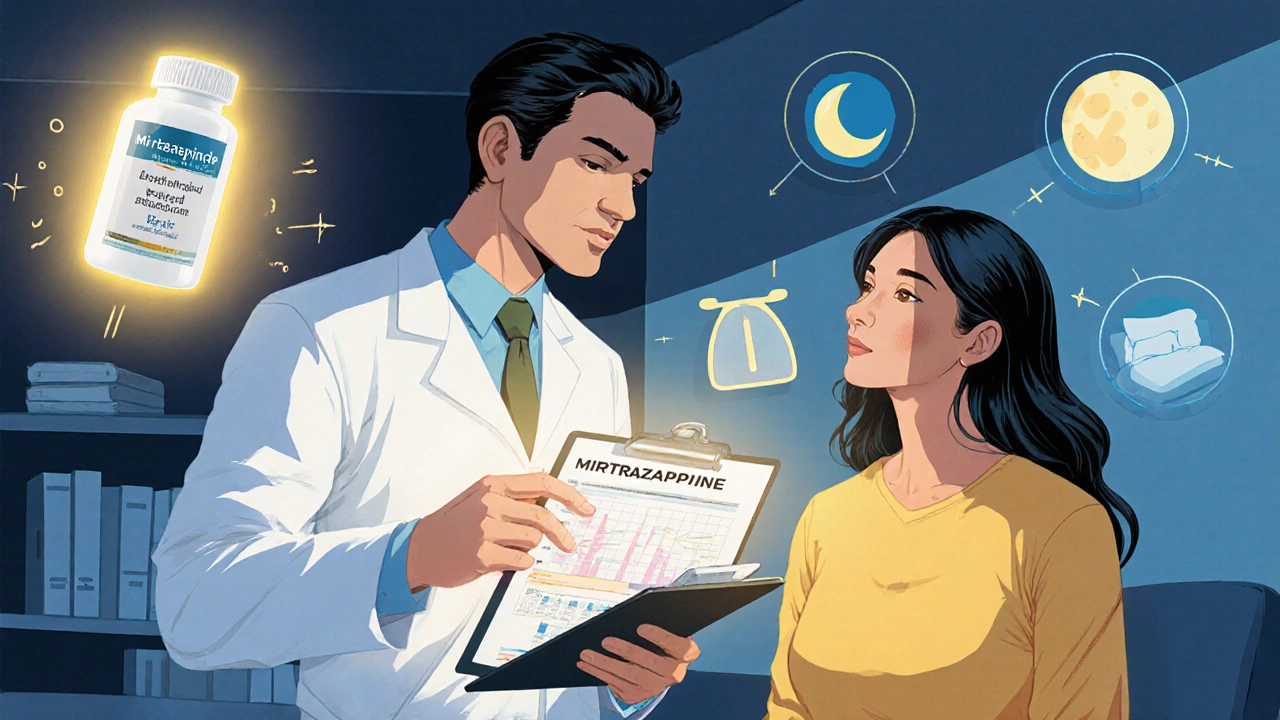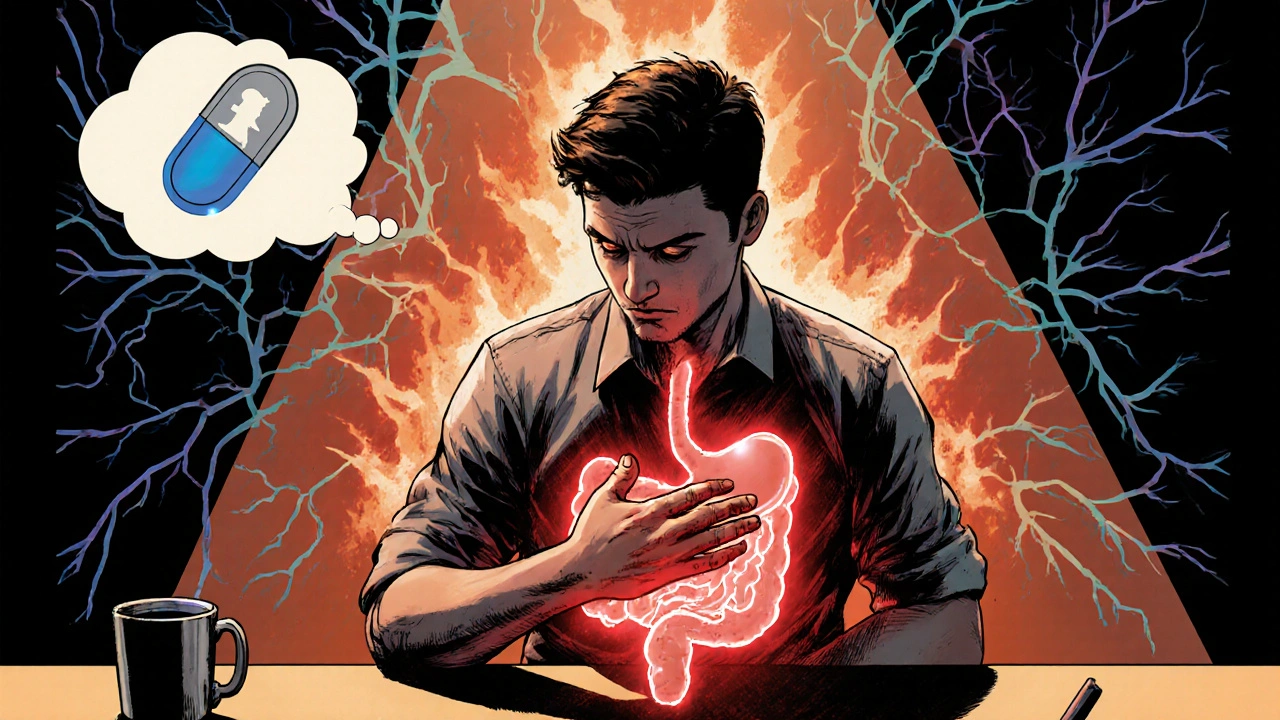Mirtazapine IBS Symptom Estimator
Symptom Assessment
This tool estimates potential symptom relief and side effects based on clinical evidence and patient experience.
Estimated Outcomes
Symptom Reduction
Abdominal Pain:
Stool Frequency:
Potential Side Effects
Weight Gain (next 3 months):
Sedation:
Note: These estimates are based on clinical evidence from the article, including a 2022 study showing 56% reduction in stool frequency at 30mg. Individual results may vary significantly.
Many patients with irritable bowel syndrome (IBS) struggle to find a drug that eases both pain and the emotional turmoil that comes with the condition. One off‑label option that’s gaining attention is Mirtazapine, a tetracyclic antidepressant originally designed for major depressive disorder. Could this medication be the missing piece for IBS sufferers? The answer isn’t black‑and‑white, but there’s enough science and real‑world experience to warrant a closer look.
How Mirtazapine Works - A Quick Overview
Irritable Bowel Syndrome is a functional gut disorder that involves abnormal motility, heightened pain perception, and changes in gut‑brain signaling. Mirtazapine acts on several neurotransmitters: it blocks α2‑adrenergic receptors, enhancing norepinephrine release, and it antagonizes 5‑HT2 and 5‑HT3 serotonin receptors. This dual action not only lifts mood but also modulates visceral sensitivity and intestinal motility, both core components of IBS.
In addition, the drug’s strong antihistamine effect (H1‑receptor blockade) can calm the gut’s smooth muscle, reducing cramping. The net result is a potential reduction in abdominal pain, bloating, and the anxiety that often amplifies IBS symptoms.
Why IBS Might Respond to an Antidepressant
- Gut‑brain axis: More than 90% of the body’s serotonin lives in the gut. Disruptions in serotonin signaling can trigger IBS‑type pain and motility issues.
- Stress and anxiety: Psychological distress heightens pain perception via the central nervous system. Antidepressants can break that loop.
- Microbiota interactions: Some studies suggest antidepressants influence gut microbiota composition, indirectly improving bowel habits.
Because Mirtazapine uniquely targets both norepinephrine and several serotonin sub‑receptors, it offers a broader approach than selective serotonin reuptake inhibitors (SSRIs), which primarily boost overall serotonin levels.
Clinical Evidence: What Studies Show
Hard data on Mirtazapine for IBS are limited, but a handful of small trials and case series give us clues.
- A 2022 open‑label study of 32 patients with IBS‑D (diarrhea‑predominant) reported a 56% reduction in average stool frequency after eight weeks of 30mg/day Mirtazapine.
- A 2020 retrospective chart review of 45 IBS patients (mixed subtypes) found significant improvements in pain scores and anxiety levels, with the greatest benefit in those who also suffered from depressive symptoms.
- Case reports from gastroenterology clinics have documented rapid relief of refractory bloating in patients who were already on a low‑dose SSRI, suggesting a synergistic effect.
While not yet FDA‑approved for IBS, the drug’s safety profile is well‑characterized, and its off‑label use is supported by these early findings.

Comparing Mirtazapine to Standard IBS Therapies
| Feature | Mirtazapine | Alosetron (5‑HT3 antagonist) | Rifaximin (non‑systemic antibiotic) |
|---|---|---|---|
| Primary mechanism | α2‑adrenergic blockade + 5‑HT2/3 antagonism | Selective 5‑HT3 receptor blockade | Modifies gut microbiota |
| Typical dose for IBS | 15‑45mg once daily (off‑label) | 0.5‑1mg daily (restricted) | 550mg three times daily for 14 days |
| Common side effects | Weight gain, sedation, dry mouth | Constipation, ischemic colitis risk | Flatulence, mild nausea |
| Effect on mood | Antidepressant effect | None | None |
| Regulatory status for IBS | Off‑label | FDA‑approved for severe IBS‑D (women) | FDA‑approved for IBS‑D |
When a patient also struggles with anxiety or depression, Mirtazapine can hit two birds with one stone, something most gut‑focused drugs can’t do.
Practical Considerations - Dosage, Side Effects, and Monitoring
- Starting dose: 15mg at bedtime. Many clinicians increase to 30mg after one week if tolerated.
- Metabolism: Primarily via CYP2D6 and CYP3A4. Check for drug interactions with common IBS meds (e.g., loperamide, antispasmodics).
- Weight gain: Up to 5kg in the first few months; discuss diet and activity plans early.
- Sleepiness: Helpful for night‑time symptoms but may impair daytime function; consider split‑dose or morning dosing if needed.
- Monitoring: Baseline liver enzymes, CBC, and mental health assessment; follow up every 4-6 weeks during titration.
Patients with a history of bipolar disorder should be screened carefully, as antidepressants can trigger mood switches.

When to Try Mirtazapine for IBS - Decision Checklist
- IBS symptoms persist despite diet, fiber, and standard antispasmodics.
- Patient reports moderate to severe anxiety, depression, or sleep disruption.
- No contraindications for tetracyclic antidepressants (e.g., uncontrolled glaucoma, severe hepatic impairment). \n
- Potential drug‑drug interactions have been ruled out using a CYP450 review.
- Patient is willing to monitor weight and sleep patterns.
If you tick most of these boxes, a short trial of Mirtazapine (8-12 weeks) can be a reasonable next step.
Bottom Line and Next Steps
While large‑scale randomized trials are still missing, the pharmacology of Mirtazapine aligns well with the core mechanisms of IBS, and early clinical observations are encouraging. For patients whose IBS is tangled with mood or sleep issues, the drug offers a dual benefit that gut‑only therapies cannot match. Always discuss off‑label use with a gastroenterologist or primary‑care physician, start low, and track both gut and mental health outcomes.
Frequently Asked Questions
Can Mirtazapine cure IBS?
No. Mirtazapine can reduce symptoms, especially pain and anxiety, but it does not address the underlying causes of IBS. It’s best used as part of a broader management plan.
What dosage is commonly used for IBS?
Clinicians typically start at 15mg at bedtime and may increase to 30mg after one week if tolerated. Some patients go up to 45mg, but higher doses raise the risk of weight gain and sedation.
Is Mirtazapine safe for long‑term use?
Long‑term safety data for depression are robust; side effects like weight gain and metabolic changes should be monitored. Regular check‑ups every 3-6 months are advised.
How does Mirtazapine compare to SSRIs for IBS?
SSRIs increase overall serotonin, which can worsen diarrhea in IBS‑D patients. Mirtazapine’s receptor‑specific antagonism often yields a more balanced effect on gut motility and pain.
Do I need a prescription to get Mirtazapine?
Yes. It’s a prescription‑only medication, even when used off‑label for IBS. A physician must assess suitability and monitor any adverse reactions.

nina greer
October 16, 2025
The discourse surrounding off‑label psychotropics in gastroenterology is decidedly overrated.
Eric Sevigny
October 17, 2025
I've actually seen a handful of patients who responded well to low‑dose mirtazapine when other gut‑targeted meds fell short.
The key is to start at 15 mg at night and watch for sedation, which many find helpful for sleep‑related IBS flares.
Don't forget to monitor weight – a few kilos can sneak up over the first couple of months.
Also, check the CYP2D6 pathway; interactions with antispasmodics are rare but possible.
Overall, it's a viable option if anxiety is a major component of the symptom picture.
Francisco Garcia
October 18, 2025
When you look at IBS through the lens of the gut‑brain axis, you quickly realize that mood and digestion are inseparable partners.
Mirtazapine, with its dual action on norepinephrine and serotonin receptors, is uniquely positioned to modulate both pain perception and emotional stress.
Clinical trials are still sparse, but the mechanistic rationale is solid, especially for patients whose anxiety spikes after a stressful meal.
In many cultures, the stigma surrounding depression makes patients reluctant to take a traditional antidepressant, yet they may be more open to a medication marketed for sleep.
Starting at bedtime can therefore serve a double purpose: it improves sleep hygiene and dampens nocturnal gut motility disturbances.
The antihistamine effect also provides a gentle anticholinergic tone that can ease cramping without the severe constipation seen with some 5‑HT3 antagonists.
Weight gain is a legitimate concern, but for many, the trade‑off of reduced abdominal pain is worth the extra pounds.
Dietary interventions should still be the backbone of treatment, with low‑FODMAP or IBS‑specific plans complementing any pharmacologic approach.
Patients often report feeling more in control once the anxiety component is blunted, leading to better adherence to dietary recommendations.
Physicians need to screen for bipolar disorder because antidepressants can sometimes trigger manic episodes, a risk that is not exclusive to mirtazapine.
Drug‑drug interactions are relatively few, though it's wise to double‑check any concurrent use of CYP3A4 inhibitors.
From a practical standpoint, the titration schedule-15 mg for a week, then possibly 30 mg-fits nicely into most clinic visit intervals.
Insurance coverage can be a hurdle, but because the drug is already approved for depression, many plans will reimburse off‑label use with proper documentation.
Long‑term safety data for chronic use in depression are reassuring, showing no major organ toxicity beyond the metabolic changes already mentioned.
In summary, if a patient’s IBS is tightly interwoven with mood disturbances, mirtazapine offers a holistic avenue worth a structured trial.
Glenda Rosa
October 18, 2025
While the hype train rolls out the red carpet for mirtazapine, let's not forget that every pharmacological knight bears hidden scars.
Sure, the dual‑receptor blockade sounds like a superhero cape, but it also drags along a chorus of side‑effects that can crash the party.
Weight gain, sedation, and a lingering dry mouth are the uninvited guests that turn a promising remedy into a bittersweet cocktail.
Before you crown it king of IBS, scrutinize the cost‑benefit balance with a skeptical eye.
Rocco Abel
October 19, 2025
One must consider the broader pharmaco‑industrial agenda that subtly nudges clinicians toward off‑label prescriptions under the guise of novel therapeutics.
The modest sample sizes and selective outcome reporting in mirtazapine studies raise eyebrows about concealed data.
It's not merely about neurotransmitter modulation; it's about the profit pipelines feeding the pharmaceutical behemoths.
Thus, while the mechanistic arguments are plausible, a discerning practitioner should demand robust, independently verified evidence before embracing this off‑label trend.
Dawn Mich
October 20, 2025
Enough with the ivory‑tower speculation – the real issue is that patients are left to fend for themselves while the medical establishment waters down accountability.
If doctors kept a transparent ledger of every off‑label script, the public would see patterns of misuse that are currently swept under the rug.
Stop treating IBS like a second‑class citizen; prescribe with honesty, not with the hidden hand of corporate influence.
We need bold, unfiltered dialogue about the risks, not the sanitized press releases that dominate journals.
Graham Smith
October 20, 2025
Just a minor correction: the drug is metabolized primarily by CYP2D6, not CYP3A4 as previously mentioned.
Also, the term “antispasmodics” should be singular when referring to a specific class.
Riley Fox
October 21, 2025
Ah, the eternal dance between science and the shadowy corridors of profit – is it not the very essence of modern medicine?!!
One could argue that every therapeutic advance carries an implicit covenant: cure today, commodify tomorrow. 😏
Yet, let us not discard mirtazapine solely on conspiratorial grounds; its pharmacodynamics deserve independent scrutiny beyond the boardroom drama.
Luke Dillon
October 22, 2025
I hear you – the tension between innovation and commercial interests can feel overwhelming, especially for patients searching for relief.
Keeping an open mind while demanding transparency is a healthy balance.
Montague Tilmen
October 22, 2025
Patriotically speaking, we should prioritize homegrown, evidence‑based treatments over imported pharmaceutical hype that ties our healthcare budget to multinational interests.
Jeremy Wessel
October 23, 2025
Great overview – the key takeaway is to match the dose to the patient's anxiety profile and monitor weight.
Graham Smith
October 24, 2025
Just a quick note: “match the dose” should be “match the dosage” for precision, and “monitor weight” benefits from specifying “regularly” to emphasize consistency.
Laura Barney
October 25, 2025
Oh, the drama of side‑effects! It’s like inviting a troupe of circus performers to a quiet dinner – entertaining at first, but soon you’re picking up popcorn crumbs from the floor.
Elle Batchelor Peapell
October 25, 2025
Life’s a gut feeling, right? Sometimes the best remedy is just to laugh at the chaos and keep moving.
Jessica H.
October 26, 2025
While the statement is succinct, it lacks substantive analysis of the clinical data supporting off‑label use, thereby reducing its scholarly value.
Jeremiah Morgan
October 27, 2025
I appreciate your critical eye; nonetheless, a brief introductory remark can serve as an effective hook, prompting readers to explore the ensuing detailed discussion.